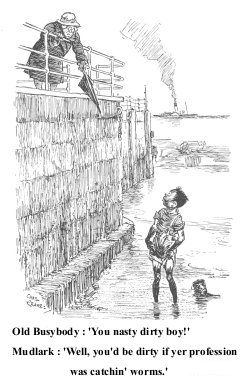
|
A Good Cheap Day Out on the FerryWe used to play and cruise on these grand old paddleboats and remember them with much fondness. As a young kid I would pack some sandwiches
and an apple and take off for a great day full of promise and
adventure. The ferry trip was always full of interest. The sight and sound and smell of the large coal-fired steam engines that drove the two large side paddle wheels. The constant ringing of the telegraph bells that signalled the many changes in the speed and paddle direction as these busy ferry boats negotiated this very active stretch of the Thames river. On the other side, in North Woolwich,
we would get off and head along to the docks. The first docks
had the two drawbridges that would hold up the traffic as they
were raised to let the large ships pass into the King George
V dock, or into the lock gates on its way out of them. The second
bridge, about ¼ mile further on, was the swing bridge.
This would swing sideways to let the ships in and out of the
Royal Albert Dock and lock gates. These particular docks had
the famous 'Samson', a floating crane, moored in the dock next
to the road. It was the largest floating crane in the world
in those days. As kids we would watch these ships as they passed through the lock gates. These gates regulated the ever- changing tidal water levels of the Thames, thus keeping the docks at a constant water level. Huge ocean-going passenger cargo ships to smaller cargo steamers would be towed skilfully through these busy and narrow lock gates by tough, sleek little shiny black tugs that were dwarfed by some of the huge ships that they had to control. They would push them with their bows, that had massive spliced rope fenders strung around them, or they would pull and hold back the ships' foreword momentum with great, thick, woven lines. I remember when some steel cables were being used for this task when suddenly one snapped under the huge load. It cracked with the sound of a cannon and whipped back viciously and would have cut a person in two like butter if they had been in its way. (I saw two cables snap like this in the lock gates over the years.) We would call up to any seamen we spotted on the ships whilst their ship was in the lock gates and ask them for any matchboxes, to add to our collections of foreign matchbox labels, along with different foreign brands of cigarette packets. Sometimes it was difficult to convey to the foreign seamen what we were requesting. We would mime striking matches and smoking and would sometimes get tossed down a fag, or even a foreign coin from their particular country. On the way home the choice was either go back via the tunnel or on the ferry. If the tunnel was chosen it was then either go down to the tunnel by the lift, or to race the lift down by running down, spiralling round and around the stairs, that wound their way around the descending lift to the bottom and the start of the long ¼ mile paved foot tunnel. It was good fun walking along, in childish awe, in the knowledge that I was actually walking under the cold dark water and mud of the Thames. We loved running and racing each other along this white glazed brick tube, lit up with lights that disappeared into the narrowing distance, that would echo back at you when we shouted and screamed with our young childhood exuberance and playful happiness. Then we would race the lift up, at the other end, back to the bright daylight world that existed above ground. We could do all this activity without getting out of breath; flipping amazing! Yes, and with only a flipping penny,
a good long and very cheap day out for us young Common
folk. |
 including
Woolwich & Districts
including
Woolwich & Districts At
the entrance to the lock gates were wooden piers with steps
leading down to the Thames River, where we would play, dodging
the waves and, if the tide was out, we would search along the
muddy beach for any treasures. We would slowly get caked in
stinky smelly Thames mud and truly look like happy little London
mud larks, proper flipping urchins, with our splotched muddy
hands, legs and clothes.
At
the entrance to the lock gates were wooden piers with steps
leading down to the Thames River, where we would play, dodging
the waves and, if the tide was out, we would search along the
muddy beach for any treasures. We would slowly get caked in
stinky smelly Thames mud and truly look like happy little London
mud larks, proper flipping urchins, with our splotched muddy
hands, legs and clothes.